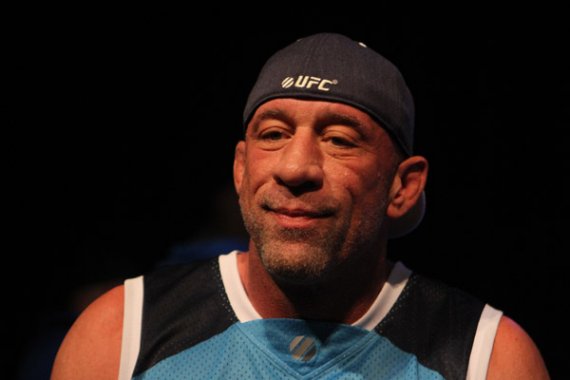
Former UFC heavyweight champion Mark Coleman
was one of numerous male athletes victimized by Dr. Richard Strauss
at Ohio State University, according to a report from
Sports Illustrated.
In a piece entitled Why Aren’t More People Talking About the
Ohio State Sex Abuse Scandal, Coleman recalls undergoing what
seemed to be an inappropriate physical examination from Strauss
upon his arrival on campus in 1986.
“He examined me pretty good. It was an eye-opener,” Coleman said.
“I don’t want to go further than that.”
At that time, Strauss was the OSU doctor for five sports programs
and the consulting physician for at least 10 others. According to
the report, Strauss would not only fondle male athletes’ genitals
during examinations — whether it was necessary or not — but he was
also known to be present at practices, in locker rooms and would
even shower with the athletes. Strauss’ bizarre and inappropriate
antics earned him monikers like “Dr. Feel Good” or “Dr.
Drop-Your-Nuts” at OSU.
“We never thought a man could sexually abuse a man,” Coleman said.
“We just played it off. We joked about it. But I don’t think we
were really joking.”
For someone like Coleman, who would go on to win an NCAA wrestling
title for the Buckeyes in 1988, it was difficult to speak out
against Strauss because the doctor was in charge of clearing the
athletes to compete.
“This guy controlled my future,” Coleman said. “We all put up with
it. For me, it was like, ‘Just clear me so I can go win an NCAA
title and make the Olympic team,” you know?”
Strauss worked at Ohio State for nearly two decades. In addition to
numerous sexual assault allegations, he was also believed to have
provided performance enhancing drugs to athletes on campus.
Coleman, however, denied to SI that he received PEDs from Strauss
but did admit that the doctor discussed them with athletes.
According to the report, Strauss could have used the distribution
of PEDs to give him leverage with those he sexually abused.
From 1978 to 1998, Strauss reportedly victimized athletes in sports
such as wrestling, football, tennis, cheerleading as well as
students who didn’t have ties to the athletic department. Per a
report commissioned by Ohio State and obtained by SI, Strauss
committed at least 1,429 instances of fondling and 47 instances of
rape.
Coleman admitted the incidents changed his demeanor, though he
didn’t completely understand the negative effects at the time.
“I didn’t know how bad it was affecting me, but now I look back and
I was very angry,” he said. “I went into practice very angry a lot
of times, storming into the wrestling room and screaming. I was
confused. I spun it as, ‘Well, it’s good to be angry, I’m gonna
have a hell of a practice and kick someone’s ass.’ But now I
realize, it wasn’t good and I realize why.”
According to SI, more than 350 athletes — including Coleman — have
sued OSU for Strauss’ actions. The school released the following
statement to SI regarding Strauss:
We express our deep regret and apologies to all who experienced
Strauss’s abuse,” the statement read. “Ohio State is a
fundamentally different university today and over the past 20 years
has committed substantial resources to prevent and address sexual
misconduct.”
Strauss’ victims were males, which may have made it easier for the
doctor to operate in secrecy, in part because of shame athletes who
competed in macho sports like football or wrestling might feel in
confessing to being victimized.
“People say, Why would they let a little man do this?” Coleman
said. “Well, it’s complicated. You felt powerless. I wasn’t going
to stir up s—, punch Dr. Strauss in the face and risk
everything.”
Though rumors regarding Strauss existed for years, it wasn’t truly
addressed until complaints of inappropriate treatment began to
mount in the 1990s. In July 1996, Strauss was stripped of his
duties in the athletic department and removed from his Student
Health Services position, but these actions were taken without
public reprimand toward the doctor. He remained at Ohio State as a
tenured professor before retiring in 1998. He later moved to
California and committed suicide in 2005 at age 67 due to
depression and abdominal pain.
When Coleman served as an assistant wrestling coach for the
Buckeyes, he noticed that a large number of athletes would quit the
team. And according to the report, there are many former OSU
athletes who are still haunted by Strauss’ abuse to this day.
“These were guys on full scholarship who could have been
All-Americans. Why did they quit?” Coleman said. “We thought they
[wimped] out. Well, now it makes total sense. I was shocked to find
out how bad [Strauss] messed guys up.”
In addition to his success at Ohio State, Coleman would go on to
become the UFC’s first heavyweight champion and Pride Fighting
Championships’ 2000 Open Weight Grand Prix Champion. He was
eventually inducted into the UFC Hall of Fame.

